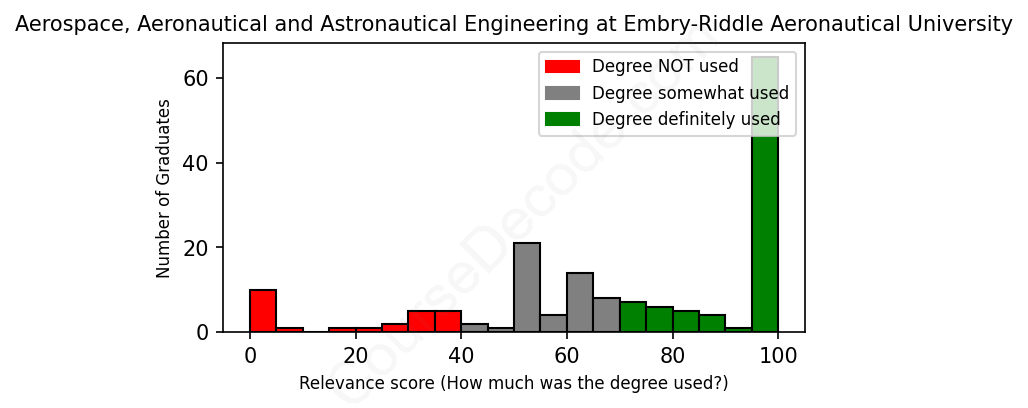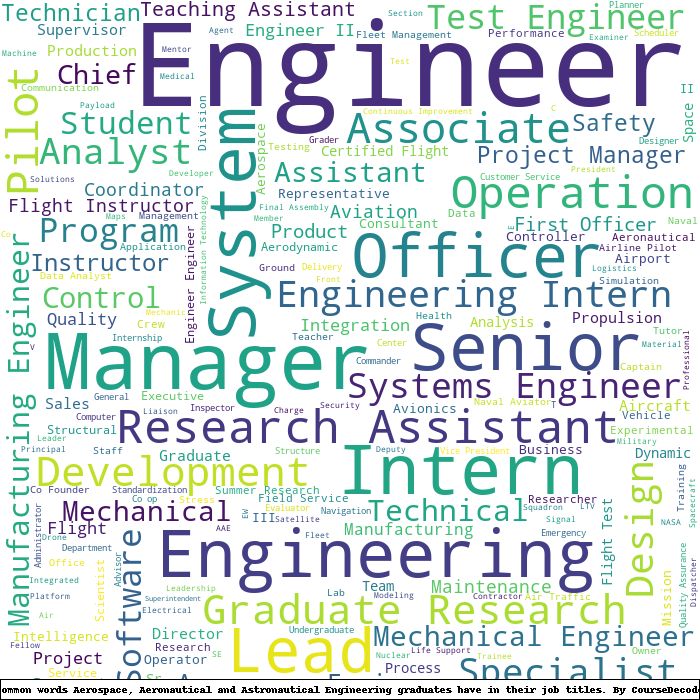
First, some facts. Of the Aerospace, Aeronautical and Astronautical Engineering graduates from Embry-Riddle Aeronautical University we've analyzed , here's how many have used (or NOT used) their degree in their career:

These are estimates based on AI analysis of 163 LinkedIn profiles (see below).
The verdict? Slightly above average. Overall, with an average relevance score of 71%, Aerospace, Aeronautical and Astronautical Engineering graduates from Embry-Riddle Aeronautical University have a slightly higher likelihood (+4%) of finding work in this field compared to the average graduate across all fields:
And for comparison, here's the chart for all profiles we've looked at across all degrees.
Also, after graduating, only 33% of these graduates have pursued further education other than another Bachelor's degree (such as a Masters degree or other), compared to the average across all profiles of 35%. This suggests a Bachelors degree is enough for most Aerospace, Aeronautical and Astronautical Engineering graduates, and it's normal to look for work straight after graduation.
See the details:
|
Relevance score: 100% We think this person has gone into a career highly relevant to their degree. We think this person has gone into a career highly relevant to their degree.
DEGREE INFOGraduated in 2017 from Embry-Riddle Aeronautical University with a Bachelor's degree in Aerospace, Aeronautical and Astronautical Engineering. Also pursued further education since (see below). JOB HISTORY SINCE GRADUATIONManufacturing Engineer Staff Lockheed Martin Jan 2023 - Present FURTHER DEGREES DONE SINCE GRADUATINGMaster of Science - MSUniversity of Arkansas Grantham 2021 - 2023 ABOUTExperienced Manufacturing with a demonstrated history of working in the Aviation & Aerospace industry. Skilled in Microsoft Excel, Lean Manufacturing, Leadership, Aerospace, and Six Sigma. Strong information technology professional with a Bachelor's degree focused in Aeronautics/Aviation/Aerospace Science and Technology and a Master's Degree of Science in Leadership. 20 year background in technical applications specializing in Aircraft technical training/ Mechanical & Electrical related areas. Extremely adaptable, dependable and highly self motivated. |
The top 10 most common jobs done by the graduates we've analyzed (ranked most common to least) are:
From analyzing the job listings for graduates of Embry-Riddle Aeronautical University with degrees in Aerospace, Aeronautical, and Astronautical Engineering, we can see a variety of interesting career paths. It’s clear that many alumni have pursued roles that directly link back to their studies and the skills they acquired. Common positions include pilots, engineers, aerospace technicians, and instructors. Many of these jobs require a solid understanding of aerospace principles, making them highly relevant to the education these individuals received. It’s noteworthy how a significant number of graduates have pursued careers in flight operations—whether as pilots or flight instructors. These roles demand extensive aviation knowledge that directly correlates with their degree program.
However, not all job paths taken by these graduates have been closely aligned with their aerospace education. Some alumni have ventured into positions that are more administrative or managerial in nature, such as project managers in various industries, marketing, or even roles in human resources. While these jobs may incorporate problem-solving skills or operational management practices that could trace back to their engineering background, they do not inherently require the technical knowledge of aerospace engineering. This suggests that while a degree in aerospace engineering can certainly open doors in technical fields, it can also lead to diverse career paths that may not utilize the core principles of the discipline directly.
In conclusion, the employment landscape for graduates from Embry-Riddle Aeronautical University showcases a strong trend toward roles directly applicable to aerospace engineering. The majority of positions are indeed relevant, particularly in aviation and engineering sectors. On the flip side, some alumni have found themselves in positions that, while valuable, do not fully leverage their rigorous academic training. It illustrates the versatility of an aerospace degree and how it can manifest in both traditional aviation roles and less conventional career paths. Overall, graduates of Embry-Riddle find themselves well-equipped to either specialize in aerospace or adapt their skills to a broader range of industries.
Here is a visual representation of the most common words in job titles for Aerospace, Aeronautical and Astronautical Engineering graduates (this is across all Aerospace, Aeronautical and Astronautical Engineering graduates we've analyzed, not just those who went to Embry-Riddle Aeronautical University):

When we look at the career trajectories of graduates from Embry-Riddle Aeronautical University who have majored in Aerospace, Aeronautical, and Astronautical Engineering, it's clear that the majority have pursued successful careers tied closely to their fields of study. Many of these graduates land their first jobs shortly after graduation in roles that typically involve hands-on engagement with aerospace technologies, like flight test engineering, piloting, or aviation management. Understandably, their educational background provides them a competitive edge in these specialized areas. For instance, earlier graduates like those from 2010 have moved into positions such as flight instructors or experimental flight test engineers, showcasing strong entries into the aerospace sector right out of college.
As we extend our view out to five or ten years post-graduation, it becomes even more apparent that many graduates continue to build on their aerospace roots. Take the graduates from 2011 and 2012 as examples—they’ve progressed into significant roles within major organizations like Boeing, NASA, and the U.S. military. Roles like senior project managers, production test pilots, and operations managers illustrate a trend where individuals are climbing the ranks within the aerospace industry. Most of these positions are not just about maintaining the status quo but involve taking leadership roles and spearheading innovative projects in aerospace technology and operations. In fact, many of these graduates seem to have found niches that allow them to combine their engineering expertise with management, potentially becoming future leaders in the industry.
On the flip side, the data does show that some graduates have veered into non-aerospace-related roles after their initial jobs. For example, we see several alumni transitioning into general management, real estate, or even roles in different industries altogether, such as human resources or marketing. This highlights that while the majority of graduates continue to thrive in aviation and aerospace roles, there are those who choose a different path that may not directly align with their education. However, overall, graduates from Embry-Riddle overwhelmingly leverage their aerospace engineering education in their early careers and continue to move into relevant roles as they gain experience. Many of them remain strongly connected to fields closely associated with aerospace, whether as engineers, pilots, or leaders within aviation organizations. This speaks volumes about the reputation of Embry-Riddle and the strong foundational skills it instills in its graduates, shaping them into highly sought-after professionals in their field.
Alright, so diving into a Bachelor’s degree in Aerospace, Aeronautical, and Astronautical Engineering is definitely no walk in the park. At Embry-Riddle, which is known for being super focused on aviation and aerospace, you can expect a pretty rigorous curriculum packed with tough subjects like fluid dynamics, trajectories, and structures. If you're really into math and physics, that’s a plus, but be ready for a good amount of heavy lifting in terms of coursework and projects. It’s considered harder than many other degrees because you’re not just learning theory; you’re also applying it practically, often working on designs and simulations. So, if you’ve got a solid work ethic and a passion for the field, you can definitely handle it, but it may take a lot of determination and late nights to get through!
Most commonly, in the LinkedIn profiles we've looked at, it takes people 4 years to finish a Bachelor degree in Aerospace, Aeronautical and Astronautical Engineering.
Let me break it down for you: graduates from Embry-Riddle Aeronautical University tend to land some pretty impressive positions in aerospace-related fields, and that usually translates to decent salaries. For instance, many of the alumni you mentioned started their careers with roles like pilot or engineer right away and moved up in prestigious organizations like the U.S. Air Force, Lockheed Martin, and Boeing. It’s no secret that these jobs often come with good pay, especially as they gain experience and take on higher responsibilities, such as becoming flight instructors, senior engineers, or even company executives.
However, not everyone took that direct flight path to high earnings. Some graduates drifted into areas like administration or took on roles with specialized focus, which might not pay as well initially. But when you look at their career trajectories, it’s clear many of them eventually found their niches in the aerospace world that can still offer solid compensation. Overall, while there's a mix of job types and salary ranges, those who graduated from Embry-Riddle generally wind up in good positions that pay decently or better.
Here is a visual representation of the most common words seen in the "about" section of LinkedIn profiles who have a Bachelor degree in Aerospace, Aeronautical and Astronautical Engineering (this is across all Aerospace, Aeronautical and Astronautical Engineering graduates we've analyzed, not just those who went to Embry-Riddle Aeronautical University). This may or may not be useful:

Here are all colleges offering a Bachelor degree in Aerospace, Aeronautical and Astronautical Engineering (ordered by the average relevance score of their Aerospace, Aeronautical and Astronautical Engineering graduates, best to worst) where we have analyzed at least 10 of their graduates:
| College | Score | Count |
|---|---|---|
 Texas A&M University Texas A&M University
|
87 | 22 |
 California Polytechnic State University-San Luis Obispo California Polytechnic State University-San Luis Obispo
|
86 | 12 |
 University of Cincinnati University of Cincinnati
|
86 | 10 |
 Purdue University Purdue University
|
85 | 40 |
 Rensselaer Polytechnic Institute Rensselaer Polytechnic Institute
|
85 | 17 |
 Georgia Institute of Technology Georgia Institute of Technology
|
84 | 23 |
 Liberty University Liberty University
|
81 | 21 |
 Iowa State University Iowa State University
|
80 | 16 |
 University of Colorado Boulder University of Colorado Boulder
|
80 | 13 |
 California State Polytechnic University-Pomona California State Polytechnic University-Pomona
|
79 | 13 |
 United States Naval Academy United States Naval Academy
|
77 | 12 |
 The Ohio State University The Ohio State University
|
76 | 20 |
 University of Central Florida University of Central Florida
|
75 | 25 |
 Arizona State University Arizona State University
|
74 | 12 |
 University of Michigan University of Michigan
|
74 | 10 |
 Embry-Riddle Aeronautical University Embry-Riddle Aeronautical University
|
71 | 163 |
 Penn State University Penn State University
|
68 | 12 |
 Florida Institute of Technology Florida Institute of Technology
|
67 | 20 |
 The University of Alabama in Huntsville The University of Alabama in Huntsville
|
67 | 11 |
 Embry Riddle Aeronautical University-Worldwide Embry Riddle Aeronautical University-Worldwide
|
66 | 10 |
 University of Illinois at Urbana-Champaign University of Illinois at Urbana-Champaign
|
48 | 10 |